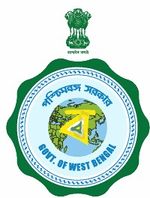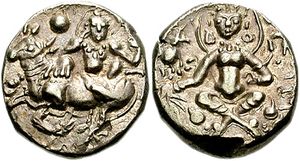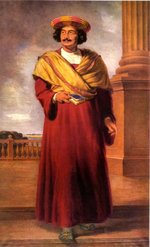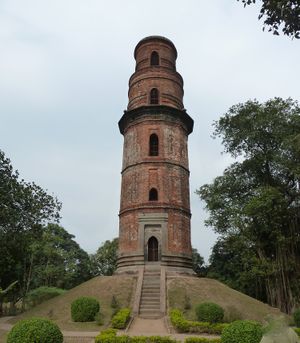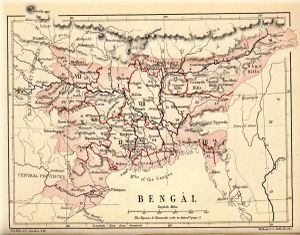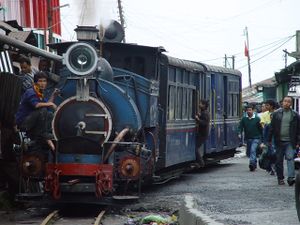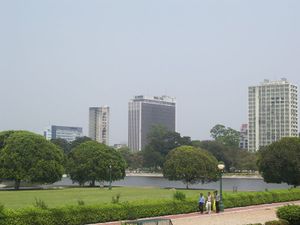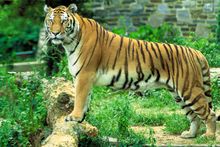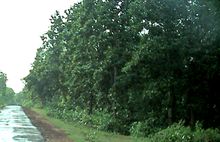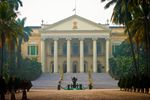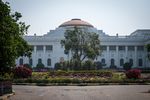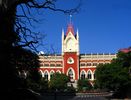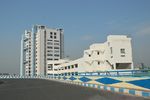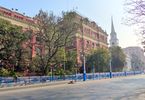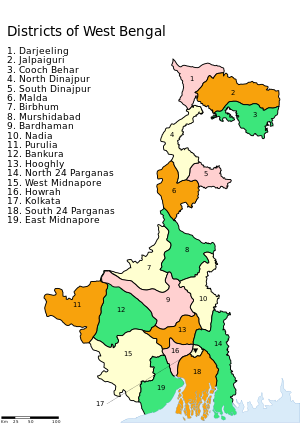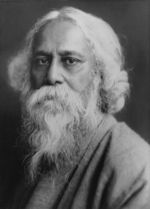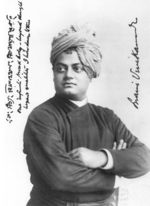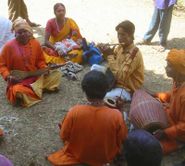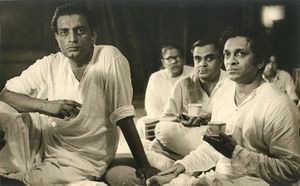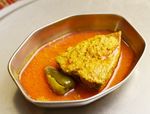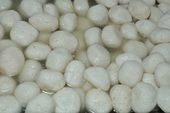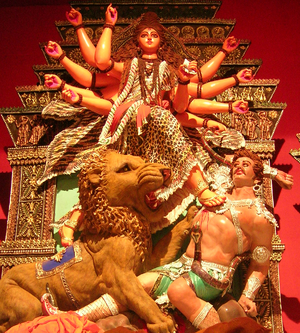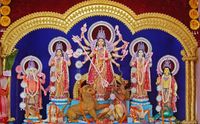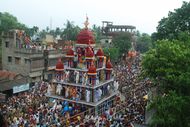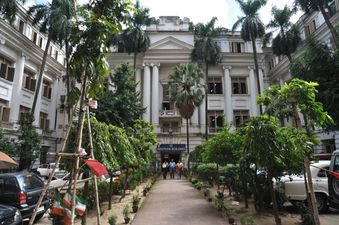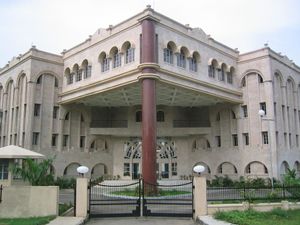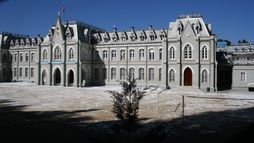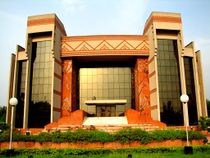البنغال الغربية
البنغال الغربية
Paschim Banga West Bengal | |
|---|---|
|
Clockwise from top: Howrah Bridge; Chhau dance in Purulia; Durga Puja; Bengal tiger in Sundarbans National Park; Darjeeling from Happy Valley Tea Estate; Digha beach; Hazarduari Palace; Dakshineswar Kali Temple | |
| أصل الاسم: الجانب الغربي من البنغال المتحدة | |
| الكنية: "Hub of all Cultural traits" | |
| الشعار: Satyameva Jayate (Truth Alone Triumphs) | |
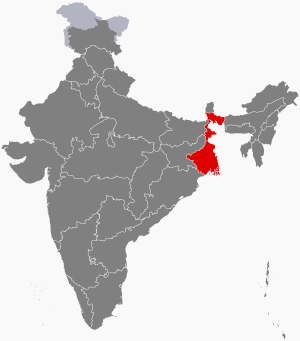 موقع البنغال الغربية | |
| البلد | |
| تأسست | 26 يناير 1950 |
| العاصمة | كلكتا |
| كلكتا |
| الأضلع | |
| الحكومة | |
| • الكيان | حكومة البنغال الغربية |
| • الحاكم | Keshari Nath Tripathi |
| • Chief Minister | Mamata Banerjee (AITC) |
| • Legislature | Legislative Assembly (295) |
| • High Court | محكمة كلكتا العليا |
| المساحة | |
| • الإجمالي | 88٬752 كم² (34٬267 ميل²) |
| ترتيب المساحة | 14th |
| التعداد (2011)[1] | |
| • الإجمالي | 91٬347٬736 |
| • الترتيب | 4th |
| • الكثافة | 1٬029/km2 (2٬670/sq mi) |
| صفة المواطن | بنغالي |
| ن.م.إ. (2018–19) | |
| • الإجمالي | ₹13٫14 lakh crore (160 بليون US$) |
| • للفرد | ₹108٬372 (US$1٬400) |
| اللغات | |
| • الرسمية | |
| • رسمية إضافية | Nepali in two sub-divisions of Darjeeling[7] |
| منطقة التوقيت | UTC+05:30 (IST) |
| ISO 3166 code | IN-WB |
| لوحة السيارة | WB |
| HDI (2017) | ▲ 0.637 (medium) · 21st[8] |
| Literacy (2011) | 77.08%[9] |
| Sex ratio (2011) | 950 ♀/1000 ♂[10] |
| الموقع الإلكتروني | www.wb.gov.in |
| ^* 294 elected, 1 nominated | |
البنغال الغربية (إنگليزية: West Bengal؛ بالبنغالي: Poshchim Bongo, pronounced: [ˈpoʃtʃim ˈbɔŋɡo] (![]() استمع), abbr. WB) هي ولاية تقع في شمالي الهند، وتبلغ مساحتها 87,853 كم². وفي عام 2023، كان يقطن الولاية 102,552,787 نسمة.[16] يدين 75% منهم بالهندوسية، و20% بالإسلام، والبقية بوذيُّون، ونصارى، ويانيون، وسيخ. يتكلم 85% من السكان اللغة البنغالية، والآخرون يتكلمون اللغة الهندية، والأوردو، وبعض اللهجات القبلية. نسبة التعليم 40%. ويعيش 30% من السكان في المراكز الحضرية. أهم المدن كَلكتا العاصمة، وأسانسول ودرغابور. West Bengal is the fourth-most populous and thirteenth-largest state by area in India, as well as the eighth-most populous country subdivision of the world. As a part of the Bengal region of the Indian subcontinent, it borders Bangladesh in the east, and Nepal and Bhutan in the north. It also borders the Indian states of Jharkhand, Odisha, Bihar, Sikkim and Assam. The state capital is Kolkata, the third-largest metropolis, and seventh largest city by population in India. West Bengal includes the Darjeeling Himalayan hill region, the Ganges delta, the Rarh region, the coastal Sundarbans and the Bay of Bengal. The state's main ethnic group are the Bengalis, with the Bengali Hindus forming the demographic majority.
استمع), abbr. WB) هي ولاية تقع في شمالي الهند، وتبلغ مساحتها 87,853 كم². وفي عام 2023، كان يقطن الولاية 102,552,787 نسمة.[16] يدين 75% منهم بالهندوسية، و20% بالإسلام، والبقية بوذيُّون، ونصارى، ويانيون، وسيخ. يتكلم 85% من السكان اللغة البنغالية، والآخرون يتكلمون اللغة الهندية، والأوردو، وبعض اللهجات القبلية. نسبة التعليم 40%. ويعيش 30% من السكان في المراكز الحضرية. أهم المدن كَلكتا العاصمة، وأسانسول ودرغابور. West Bengal is the fourth-most populous and thirteenth-largest state by area in India, as well as the eighth-most populous country subdivision of the world. As a part of the Bengal region of the Indian subcontinent, it borders Bangladesh in the east, and Nepal and Bhutan in the north. It also borders the Indian states of Jharkhand, Odisha, Bihar, Sikkim and Assam. The state capital is Kolkata, the third-largest metropolis, and seventh largest city by population in India. West Bengal includes the Darjeeling Himalayan hill region, the Ganges delta, the Rarh region, the coastal Sundarbans and the Bay of Bengal. The state's main ethnic group are the Bengalis, with the Bengali Hindus forming the demographic majority.
The area's early history featured a succession of Indian empires, internal squabbling, and a tussle between Hinduism and Buddhism for dominance. Ancient Bengal was the site of several major Janapadas, while the earliest cities date back to the Vedic period. The region was part of several ancient pan−Indian empires, including the Vangas, Mauryans, and the Guptas. The citadel of Gauḍa served as the capital of the Gauḍa Kingdom, the Pala Empire, and the Sena Empire. Islam was introduced through trade with the Abbasid Caliphate, but following the Ghurid conquests led by Bakhtiyar Khalji and the establishment of the Delhi Sultanate, the Muslim faith spread across the entire Bengal region. During the Bengal Sultanate, the territory was a major trading nation in the world, and was often referred by the Europeans as the "richest country to trade with". It was absorbed into the Mughal Empire in 1576. Simultaneously, some parts of the region were ruled by several Hindu states, and Baro-Bhuyan landlords, and part of it was briefly overrun by the Suri Empire. Following the death of Emperor Aurangzeb in the early 1700s, the proto-industrialised Mughal Bengal became a semi-independent state under the Nawabs of Bengal, and showed signs of the first Industrial revolution.[17][18] The region was later annexed into the Bengal Presidency by the British East India Company after the Battle of Buxar in 1764.[19][20] From 1772 to 1911, Calcutta was the capital of all of East India Company's territories and then the capital of the entirety of India after the establishment of the Viceroyalty.[21] From 1912 to India's Independence in 1947, it was the capital of the Bengal Province.[22]
The region was a hotbed of the Indian independence movement and has remained one of India's great artistic and intellectual centres.[23] Following widespread religious violence, the Bengal Legislative Council and the Bengal Legislative Assembly voted on the Partition of Bengal in 1947 along religious lines into two independent dominions: West Bengal, a Hindu-majority Indian state, and East Bengal, a Muslim-majority province of Pakistan which later became the independent Bangladesh. The state was also flooded with Hindu refugees from East Bengal (present-day Bangladesh) in the decades following the 1947 partition of India, transforming its landscape and shaping its politics.[24][25] The early and prolonged exposure to British administration resulted in an expansion of Western education, culminating in developments in science, institutional education, and social reforms in the region, including what became known as the Bengali Renaissance. Several regional and pan−Indian empires throughout Bengal's history have shaped its culture, cuisine, and architecture.
Post-Indian independence, as a welfare state, West Bengal's economy is based on agricultural production and small and medium-sized enterprises.[26] The state's cultural heritage, besides varied folk traditions, ranges from stalwarts in literature including Nobel-laureate Rabindranath Tagore to scores of musicians, film-makers and artists. For several decades, the state underwent political violence and economic stagnation after the beginning of communist rule in 1977 before it rebounded.[27] In 2023–24, the economy of West Bengal is the sixth-largest state economy in India with a gross state domestic product (GSDP) of ₹17٫19 lakh crore (220 بليون US$),[11] and has the country's 20th-highest GSDP per capita of ₹121٬267 (US$1٬500)[28] as of 2020–21. Despite being one of the fastest-growing major economies, West Bengal has struggled to attract foreign direct investment due to adverse land acquisition policies, poor infrastructure, and red tape.[29][30] It also has the 26th-highest ranking among Indian states in human development index, with the index value being lower than the Indian average.[8][26] The state government debt of ₹6٫47 lakh crore (81 بليون US$), or 37.67% of GSDP, has dropped from 40.65% since 2010–11.[31][11] West Bengal has three World Heritage sites and ranks as the eight-most visited tourist destination in India and third-most visited state of India globally.[32][33]
أصل الاسم
The origin of the name Bengal (Bangla and Bongo in Bengali) is unknown. One theory suggests the word derives from "Bang", the name of a Dravidian tribe that settled the region around 1000 BCE.[34] The Bengali word Bongo might have been derived from the ancient kingdom of Vanga (or Banga). Although some early Sanskrit literature mentions the name Vanga, the region's early history is obscure.[35]
In 1947, at the end of British rule over the Indian subcontinent the Bengal Legislative Council and the Bengal Legislative Assembly voted on the Partition of Bengal along religious lines into two separate entities: West Bengal, which continued as an Indian state, and East Bengal, a province of Pakistan, which came to be known be as East Pakistan and later became the independent Bangladesh.[36][37]
In 2011 the Government of West Bengal proposed a change in the official name of the state to PaschimBanga (بالبنغالية: পশ্চিমবঙ্গ Pôshchimbônggô).[38] This is the native name of the state, literally meaning "western Bengal" in the native Bengali language. In August 2016 the West Bengal Legislative Assembly passed another resolution to change the name of West Bengal to "Bengal" in English, and "Bangla" in Bengali. Despite the Trinamool Congress government's efforts to forge a consensus on the name change resolution, the Indian National Congress, the Left Front, and the Bharatiya Janata Party opposed the resolution.[39] However, the central government has turned down the proposal maintaining the state should have one single name for all languages instead of three, and it should not be the same as that of any other territory (pointing out that the name 'Bangla' may create confusion with neighboring Bangladesh).[39][40][41]
التاريخ
الفترة القديمة والكلاسيكية
عـُثـِر على أدوات من العصر الحجري تعود إلى 20,000 سنة مضت في حفريات بالولاية، تبين أن الاستيطان البشري كان متواجداً قبل 8,000 سنة من تقديرات الدارسين.[42] وحسب الملحمة الهندية مهابهاراتا فإن المنطقة كانت جزءاً من مملكة ڤانگا.[43] وكان تواجد عدد من الأملاك الڤيدية في منطقة البنغال، بما في ذلك ڤانگا، رار، و پوندراڤردانا، ومملكة سوهما. أحد أقدم الإشارات الأجنبية إلى البنغال كان من اليونانيين القدماء حوالي 100 ق.م. لأرض تُدعى گانگاريداي وتقع في مصب الگانج.[44] وكان للبنغال تجارة وراء البحار مع سوڤارنابومي (بورما وتايلند السفلى وأسفل شبه جزيرة الملايو، وسومطرة).[45] وحسب التأريخ السريلانكي مهاڤامسا، فإن الأمير ڤيجايا (ح. 543-505 ق.م.)، من مملكة ڤانگا، هزم لانكا (سري لانكا الحالية) وأسمى البلد مملكة سنهالا.[46]
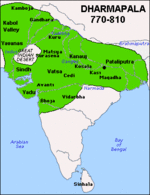
|
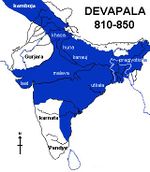
| |
امبراطورية پالا في عهد دارماپالا
|
امبراطورية پالا في عهد دڤاپالا
|
تُعدّ سلالة الدراڤيديين أولى السلالات التي سكنت الهند، وهم جماعات صغيرة، كانت تمارس جمع الثمار والصيد. حوالي عام 200 ق.م، كانت البنغال جزءًا من إمبراطورية موريا.
دخلها الإسلام في مطلع القرن السابع الهجري، الثالث عشر الميلادي، في عهد الدولة العباسية.[47] وإثر الفتوحات المبكرة التي قام بها محمد بن بختيار خلجي وتأسيس سلطنة دلهي، انتشر الإسلام في منطقة البنغال. ولاحقاً بين الفينة والأخرى، دعم غزاة مسلمون عملية اعتناق السكان الإسلام ببنائهم المساجد والمدارس والخانقاوات. وفي عهد سلطنة البنغال الإسلامية، التي تأسست في 1352، أصبحت البنغال أمة تجارية كبرى على مستوى العالم وكثيراً ما كان الأوروپيون يشيرون إليها بأنها أغنى بلد يمكنهم التجارة معه.[48] ومن بعدهم جاء الأفغان، ثم استطاع الإمبراطور المغولي، أكبر، بسط نفوذه على البنغال الغربية، في 1576، فامتص سلطنة البنغال في سلطنة المغل.[49]
الفترات القروسطية والحديثة المبكرة
الفترة الاستعمارية
أثار المد الإسلامي الأوروبيين فتوجهت أنظارهم إليها. وفي عام 1700، أصبحت البنغال دولة مستقلة، ولكن تحت سيطرة فعلية لشركة الهند الشرقية البريطانية، التي احتكرت إمكانات الولاية الاقتصادية.
في القرن التاسع عشر الميلادي، أصبحت البنغال المركز السياسي والاقتصادي للهند البريطانية واتسعت رقعتها، بعد دارجيلنگ، وما حولها. أدّى تقسيم اللورد كرزون للبنغال إلى ولايتين جديدتين هما: البنغال الغربية، وآسام وولاية البنغال الشرقية وأوريسا وبيهار إلى:
- ظهور معارضة قوية للحكم البريطاني وسط البنغاليين.
- وضع بذور الشقاق بين المسلمين، والهندوس الذي انتهى إلى انفصال باكستان بقسميها الشرقي والغربي عن الهند.
- حدوث هجرات ضخمة للمسلمين إلى باكستان، والهندوس إلى الهند. وقد صاحب تلك الهجرات الكثير من إراقة الدماء.
من أعلام البنغال الشاعر والروائي طاغور، الذي حاز جائزة نوبل للآداب عام 1913.
استقلال الهند وما بعده
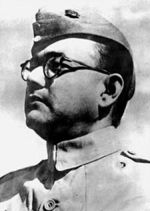
الجغرافيا
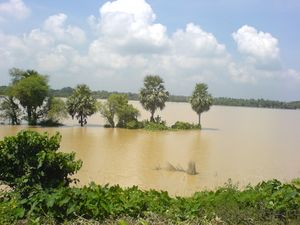
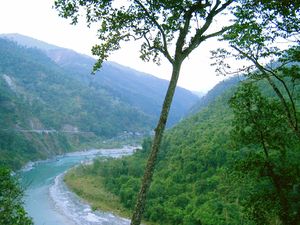
ولاية البنغال الغربية في معظمها سهول دلتاوية تنتشر فيها الرواسب الفيضانية والمستنقعات الطينية. الجزء الشمالي من الولاية به سفوح جبال الهملايا، التي ترتفع إلى 4,000م. أما الجزء الغربي، فيتكون من مرتفعات تنحدر تدريجيًا، نحو هضبة شوتاناجبور في ولاية بيهار.
هنالك ثلاثة فصول مناخية في الولاية هي: فصل حار جاف، يمتد من مارس إلى منتصف يونيو، فصل حار ممطر، يشمل الفترة من يونيو إلى سبتمبر، فصل بارد جاف، من أكتوبر إلى فبراير.
بالبنغال الغربية ثلاثة أنهار هي: نهر الگنج، ونهر هوگلي، ونهر دمادار.
دارجيلنگ، تقع فوق تلال البنغال الغربية، وتعتبر مركزًا لإنتاج الشاي. يزرع ربع محصول الشاي الهندي في هذه المنطقة، يلتقط العمال حوالي 18كجم من ورق الشاي يوميًا.
الاقتصاد
| Gross State Domestic Product at Current Prices (93–94 Base)[50]
الأرقام بالكرورى روپية هندية | |
| السنة | الناتج المحلي الإجمالي للولاية |
|---|---|
| 1999–2000 | 135,182 |
| 2000–2001 | 143,532 |
| 2001–2002 | 157,136 |
| 2002–2003 | 168,047 |
| 2003–2004 | 189,099 |
| 2004–2005 | 208,578 |
| 2005–2006 | 236,044 |
المجتمع في البنغال الغربية زراعي، ويُمثِّل الأرز 80% من مساحة الأراضي المزروعة. أما المحاصيل الأخرى فتشمل: الجوت، والذرة، والحبوب الزيتية، والتبغ والخضراوات، وتسهم الولاية بنحو 25% من إنتاج الشاي في الهند، وتتركز زراعته حول دارجيلنگ.
تُسهم البنغال الغربية بربع إنتاج الهند من المعادن، وأهمها الفحم، والحديد.
مازالت الصناعات اليدوية مهمة، خاصة صناعة الحرير الطبيعي والفخار. أما الصناعات الحديثة فتشمل: الصناعات الهندسية، وصناعة الجوت، اللتين بدأتا في القرن التاسع عشر الميلادي. هذا بجانب صناعة الورق والنسيج، والصناعات الإلكترونيَّة والكيميائية وغيرها.
ترتبط البنغال الغربية بالسكك الحديدية والطرق مع بقية الهند، وتصدر فيها عدة صحف، كما تحتل المرتبة الثانية من حيث توزيع الصحف اليومية في الهند؛ فيوزع فيها مليونان من النسخ يوميًا.
النبيت والوحيش
| العنوان | الرمز | الصورة |
|---|---|---|
| حيوان الولاية | Fishing cat[51] | 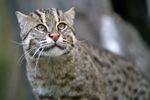
|
| طائر الولاية | White-throated kingfisher | 
|
| زهرة الولاية | Night-flowering jasmine[51] | 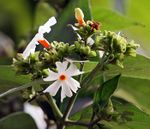
|
| شجرة الولاية | Devil tree[51] | 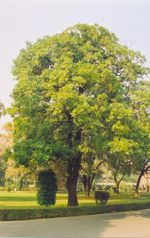
|
الحكومة والسياسة
West Bengal is governed through a parliamentary system of representative democracy, a feature the state shares with other Indian states. Universal suffrage is granted to residents. There are two branches of government. The legislature, the West Bengal Legislative Assembly, consists of elected members and special office bearers such as the Speaker and Deputy Speaker, who are elected by the members. Assembly meetings are presided over by the Speaker or the Deputy Speaker in the Speaker's absence. The judiciary is composed of the Calcutta High Court and a system of lower courts. Executive authority is vested in the Council of Ministers headed by the Chief Minister although the titular head of government is the Governor. The Governor is the Head of State appointed by the President of India. The leader of the party or coalition with a majority in the Legislative Assembly is appointed as the Chief Minister by the Governor. The Council of Ministers is appointed by the Governor on the advice of the Chief Minister. The Council of Ministers reports to the Legislative Assembly. The Assembly is unicameral with 295 members, or MLAs,[52] including one nominated from the Anglo-Indian community. Terms of office run for five years unless the Assembly is dissolved before the completion of the term. Auxiliary authorities known as panchayats, for which local body elections are regularly held, govern local affairs. The state contributes 42 seats to the Lok Sabha[53] and 16 seats to the Rajya Sabha of the Indian Parliament.[54]
Politics in West Bengal is dominated by the All India Trinamool Congress (AITC), Bharatiya Janata Party (BJP), Indian National Congress (INC), and the Left Front alliance (led by the Communist Party of India (Marxist) or CPI(M)). Following the West Bengal State Assembly Election in 2011, the All India Trinamool Congress and Indian National Congress coalition under Mamata Banerjee of the All India Trinamool Congress was elected to power with 225 seats in the legislature.[55]
Prior to this, West Bengal was ruled by the Left Front for 34 years (1977–2011), making it the world's longest-running democratically elected communist government.[56] Banerjee was re-elected twice as Chief Minister in the 2016 West Bengal Legislative Assembly election and 2021 West Bengal Legislative Assembly election with 211 and 215 seats respectively, an absolute majority by the Trinamool Congress.[57] The state has one autonomous region, the Gorkhaland Territorial Administration.[58]
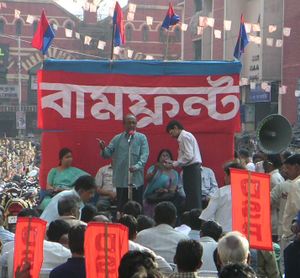
التقسيم الإداري - الأضلع
 مقالة مفصلة: قائمة أضلع البنغال الغربية
مقالة مفصلة: قائمة أضلع البنغال الغربية
As of 2017, West Bengal is divided into 23 districts.[59]
| District | Population | Growth rate | Sex ratio | Literacy | Density per square Kilometer |
|---|---|---|---|---|---|
| North 24 Parganas | 10,009,781 | 12.04 | 955 | 84.06 | 2445 |
| South 24 Parganas | 8,161,961 | 18.17 | 956 | 77.51 | 819 |
| Purba Bardhaman[أ] | – | – | – | – | – |
| غرب بردهامن[أ] | 2,882,031 | – | 922 | 78.75 | 1,800 |
| Murshidabad | 7,103,807 | 21.09 | 958 | 66.59 | 1334 |
| West Midnapore | 5,913,457 | 13.86 | 966 | 78.00 | 631 |
| Hooghly | 5,519,145 | 9.46 | 961 | 81.80 | 1753 |
| ناديا | 5,167,600 | 12.22 | 947 | 74.97 | 1316 |
| East Midnapore | 5,095,875 | 15.36 | 938 | 87.02 | 1081 |
| Howrah | 4,850,029 | 13.50 | 939 | 83.31 | 3306 |
| Kolkata | 4,496,69 | −1.67 | 908 | 86.31 | 24306 |
| Maldah | 3,988,845 | 21.22 | 944 | 61.73 | 1069 |
| Jalpaiguri | 3,872,846 | 13.87 | 953 | 73.25 | 622 |
| Alipurduar[ب] | 1,700,000 | – | – | – | 400 |
| Bankura | 3,596,292 | 12.64 | 954 | 70.95 | 523 |
| Birbhum | 3,502,404 | 16.15 | 956 | 70.68 | 771 |
| North Dinajpur | 3,007,134 | 23.15 | 939 | 59.07 | 958 |
| Purulia | 2,930,115 | 15.52 | 957 | 64.48 | 468 |
| Cooch Behar | 2,819,086 | 13.71 | 942 | 74.78 | 832 |
| Darjeeling | 1,846,823 | 14.77 | 970 | 79.56 | 586 |
| Dakshin Dinajpur | 1,676,276 | 11.52 | 956 | 72.82 | 755 |
| Kalimpong[ب] | 202,239 | – | – | – | – |
| Jhargram[ب] | 1,136,548 | – | – | – | – |
Each district is governed by a district collector or district magistrate, appointed by either the Indian Administrative Service or the West Bengal Civil Service.[60] Each district is subdivided into sub-divisions, governed by a Sub-Divisional Magistrate, and again into blocks. Blocks consists of panchayats (village councils) and town municipalities.[61]
The capital and largest city of the state is Kolkata—the third-largest urban agglomeration[62] and the seventh-largest city[63] in India. Asansol is the second-largest city and urban agglomeration in West Bengal.[62] Siliguri is an economically important city, strategically located in the northeastern Siliguri Corridor (Chicken's Neck) of India.[64] Other larger cities and towns in West Bengal are: Durgapur, Howrah, Bardhaman, Baharampur, Jalpaiguri, Kharagpur, and Chandannagar.[65]
المدن
The capital and largest city of the state is Kolkata—the third-largest urban agglomeration[62] and the seventh-largest city[66] in India. Asansol is the second-largest city and urban agglomeration in West Bengal.[62]
Major planned cities of West Bengal include Bidhannagar, New Town, Kalyani, Haldia, Durgapur and Kharagpur. Kolkata has some planned neighbourhoods like New Garia, Tollygunge, and Lake Town. Siliguri is an economically important city, strategically located in the northeastern Siliguri Corridor (Chicken's Neck) of India.[67] Other larger cities and towns in West Bengal are Howrah, Chandannagar, Bardhaman, Baharampur, Jalpaiguri, and Purulia etc.[68]
الديمغرافيا
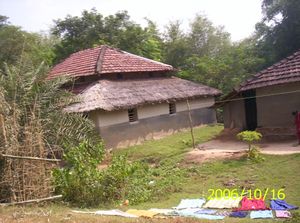
| النمو السكاني | |||
|---|---|---|---|
| Census | Pop. | %± | |
| 1951 | 26٬300٬000 | ||
| 1961 | 34٬926٬000 | 32.8% | |
| 1971 | 44٬312٬000 | 26.9% | |
| 1981 | 54٬581٬000 | 23.2% | |
| 1991 | 68٬078٬000 | 24.7% | |
| 2001 | 80٬176٬000 | 17.8% | |
| Source:Census of India[69] | |||
الثقافة
الأدب
The Bengali language boasts a rich literary heritage it shares with neighbouring Bangladesh. West Bengal has a long tradition of folk literature, evidenced by the Charyapada, a collection of Buddhist mystic songs dating back to the 10th and 11th centuries; Mangalkavya, a collection of Hindu narrative poetry composed around the 13th century; Shreekrishna Kirtana, a pastoral Vaishnava drama in verse composed by Boru Chandidas; Thakurmar Jhuli, a collection of Bengali folk and fairy tales compiled by Dakshinaranjan Mitra Majumder; and stories of Gopal Bhar, a court jester in medieval Bengal. In the 19th and 20th centuries, Bengali literature was modernised in the works of authors such as Bankim Chandra Chattopadhyay, whose works marked a departure from the traditional verse-oriented writings prevalent in that period;[72] Michael Madhusudan Dutt, a pioneer in Bengali drama who introduced the use of blank verse;[73] and Rabindranath Tagore, who reshaped Bengali literature and music. Indian art saw the introduction of Contextual Modernism in the late 19th and early 20th centuries.[74] Other notable figures include Kazi Nazrul Islam, whose compositions form the avant-garde genre of Nazrul Sangeet,[75] Sarat Chandra Chattopadhyay, whose works on contemporary social practices in Bengal are widely acclaimed,[76] and Manik Bandyopadhyay, who is considered one of the leading lights of modern Bengali fiction.[77] In modern times, Jibanananda Das has been acknowledged as "the premier poet of the post-Tagore era in India".[78] Other writers include: Bibhutibhushan Bandopadhyay, best known for his work Pather Panchali; Tarashankar Bandopadhyay, well known for his portrayal of the lower strata of society;[79] Manik Bandopadhyay, a pioneering novelist; and Ashapurna Devi, Shirshendu Mukhopadhyay, Saradindu Bandopadhyay, Buddhadeb Guha, Mahashweta Devi, Samaresh Majumdar, Sanjeev Chattopadhyay, Shakti Chattopadhyay, Buddhadeb Basu,[80] Joy Goswami, and Sunil Gangopadhyay.[81][82]
الموسيقى والرقص
الأفلام
الفنون الجميلة
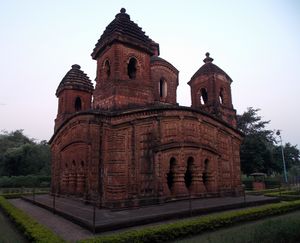
التراث الإصلاحي
The capital, Kolkata, was the workplace of several social reformers, including Raja Ram Mohan Roy, Iswar Chandra Vidyasagar, and Swami Vivekananda. Their social reforms eventually led to a cultural atmosphere that made it possible for practices like sati, dowry, and caste-based discrimination, or untouchability, to be abolished.[83] The region was also home to several religious teachers, such as Chaitanya, Ramakrishna, Prabhupada, and Paramahansa Yogananda.[83]
المطبخ
Rice and fish are traditional favourite foods, leading to a saying in Bengali, "machhe bhate bangali", that translates as "fish and rice make a Bengali".[84] Bengal's vast repertoire of fish-based dishes includes hilsa preparations, a favourite among Bengalis. There are numerous ways of cooking fish depending on its texture, size, fat content, and bones.[85] Most of the people also consume eggs, chicken, mutton, and shrimp. Panta bhat (rice soaked overnight in water) with onion and green chili is a traditional dish consumed in rural areas.[86] Common spices found in a Bengali kitchen include cumin, ajmoda (radhuni), bay leaf, mustard, ginger, green chillies, and turmeric.[87] Sweets occupy an important place in the diet of Bengalis and at their social ceremonies. Bengalis make distinctive sweetmeats from milk products, including Rôshogolla, Chômchôm, Kalojam, and several kinds of sondesh. Pitha, a kind of sweet cake, bread, or dim sum, are specialties of the winter season. Sweets such as narkol-naru, til-naru, moa, and payesh are prepared during festivals such as Lakshmi puja.[88] Popular street foods include Aloor Chop, Beguni, Kati roll, biryani, and phuchka.[89][90]
اللباس
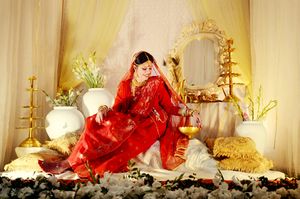
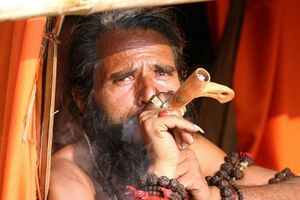
الأعياد
التعليم
جامعة كلكتا, the oldest public university of India.
West Bengal schools are run by the state government or private organisations, including religious institutions. Instruction is mainly in English or Bengali, though Urdu is also used, especially in Central Kolkata. Secondary schools are affiliated with the Council for the Indian School Certificate Examinations (CISCE), the Central Board for Secondary Education (CBSE), the National Institute of Open School (NIOS), West Bengal Board of Secondary Education, or the West Bengal Board of Madrasah Education.[91]
As of 2016 85% of children within the 6 to 17-year age group attend school (86% do so in urban areas and 84% in rural areas). School attendance is almost universal among the 6 to 14-year age group then drops to 70% with the 15 to 17-year age group. There is a gender disparity in school attendance in the 6 to 14-year age group, more girls than boys are attending school. In Bengal, 71% of women aged 15–49 years and 81% of men aged 15–49 years are literate. Only 14% of women aged 15–49 years in West Bengal have completed 12 or more years of schooling, compared with 22% of men. 22% of women and 14% of men age 15–49 years have never attended school.[92]
Some of the notable schools in the city are: La Martiniere Calcutta, Calcutta Boys' School, St. James' School (Kolkata), St. Xavier's Collegiate School, and Loreto House, Loreto Convent, Asansol some of which rank amongst the best schools in the country.[93] Many of the schools in Kolkata and Darjeeling are colonial-era establishments housed in buildings that are exemplars of neo-classical architecture. Darjeeling's schools include: St. Paul's, St. Joseph's North Point, Goethals Memorial School, and Dow Hill in Kurseong.[94]
West Bengal has eighteen universities.[95][96] Kolkata has played a pioneering role in the development of the modern education system in India. It was the gateway to the revolution of European education during the British Raj.[97] Sir William Jones established the Asiatic Society in 1794 to promote oriental studies. People such as Ram Mohan Roy, David Hare, Ishwar Chandra Vidyasagar, Alexander Duff and William Carey played leading roles in setting up modern schools and colleges in the city.[98]
The University of Calcutta, the oldest public university in India, has 136 affiliated colleges. Fort William College was established in 1810. The Hindu College was established in 1817. The Lady Brabourne College was established in 1939. The Scottish Church College, the oldest Christian liberal arts college in South Asia, started in 1830. In 1855 the Hindu College was renamed the Presidency College.[99] The state government granted it university status in 2010 and it was renamed Presidency University. Kazi Nazrul University was established in 2012. The University of Calcutta and Jadavpur University are prestigious technical universities.[100] Visva-Bharati University at Santiniketan is a central university and an institution of national importance.[101]
Other higher education institutes of importance in West Bengal include: St. Xavier's College, Kolkata, Indian Institute of Foreign Trade, Indian Institute of Management Calcutta (the first IIM), Indian Institute of Science Education and Research, Kolkata, Indian Statistical Institute, Indian Institute of Technology Kharagpur (the first IIT), Indian Institute of Engineering Science and Technology, Shibpur (the first IIEST), Indian Institute of Information Technology, Kalyani, National Institute of Technology, Durgapur, National Institute of Technical Teachers' Training and Research, Kolkata, National Institute of Pharmaceutical Education and Research, Kolkata, and West Bengal National University of Juridical Sciences. In 2003 the state government supported the creation of West Bengal University of Technology, West Bengal University of Health Sciences, West Bengal State University, and Gour Banga University.[102]
Jadavpur University (Focus area—Mobile Computing and Communication and Nano-science), and the University of Calcutta (Modern Biology) are among two of the fifteen universities selected under the "University with Potential for Excellence" scheme. University of Calcutta (Focus Area—Electro-Physiological and Neuro-imaging studies including mathematical modeling) has also been selected under the "Centre with Potential for Excellence in a Particular Area" scheme.[103]
In addition, the state is home to Kalyani University, The University of Burdwan, Vidyasagar University, and North Bengal University all well as established and nationally renowned schools to cover education needs at the district level and the Indian Institute of Science Education and Research, Kolkata. Apart from this there is a Deemed university run by the Ramakrishna mission named Ramakrishna Mission Vivekananda University at Belur Math.[104]
There are several research institutes in Kolkata. The Indian Association for the Cultivation of Science is the first research institute in Asia. C. V. Raman was awarded the Nobel Prize for his discovery (Raman Effect) done at the IACS. The Bose Institute, Saha Institute of Nuclear Physics, S. N. Bose National Centre for Basic Sciences, Indian Institute of Chemical Biology, Central Glass and Ceramic Research Institute, Central Mechanical Engineering Research Institute Durgapur, Central Research Institute for Jute and Allied Fibers, National Institute of Research on Jute and Allied Fibre Technology, Central Inland Fisheries Research Institute, National Institute of Biomedical Genomics (NIBMG), Kalyani, and the Variable Energy Cyclotron Centre are the most prominent.[102]
Notable scholars who were born, worked, or studied in the geographic area of the state include physicists: Satyendra Nath Bose, Meghnad Saha,[105] and Jagadish Chandra Bose;[106] chemist Prafulla Chandra Roy;[105] statisticians Prasanta Chandra Mahalanobis and Anil Kumar Gain;[105] physician Upendranath Brahmachari;[105] educator Ashutosh Mukherjee;[107] and Nobel laureates Rabindranath Tagore,[108] C. V. Raman,[106] and Amartya Sen.[109]
انظر أيضًا
- Bengali alphabet
- Bengali Language Movement
- Bibliography of India
- Ghoti people, Bangal
- History of India
- Index of India-related articles
- List of colleges and universities in West Bengal
- List of Hindu festivals
- List of people from West Bengal
- Music of Bengal, Cinema of West Bengal, Architecture of Bengal
- Outline of India
- Outline of West Bengal
- Partition of Bengal (1905)
- Partition of Bengal (1947)
- Tourism in West Bengal
- Tourist attractions in West Bengal
- أكبر
- رابندرانات طاغور
- كلكتا
انظر أيضاً
الهامش
- ^ "Area, population, decennial growth rate and density for 2001 and 2011 at a glance for West Bengal and the districts: provisional population totals paper 1 of 2011: West Bengal". Registrar General & Census Commissioner, India. Archived from the original on 7 January 2012. Retrieved 26 January 2012.
- ^ "West Bengal Budget Analysis 2018–19" (PDF). Centre for Budget and Governance Accountability, India. Retrieved 1 February 2018.
- ^ "Medium term fiscal policy statement & fiscal policy stratergy statement for 2018–19" (PDF). Finance Department, Government of West Bengal. January 2018. p. 6. Retrieved 8 June 2018.
- ^ "Fact and Figures". www.wb.gov.in. Retrieved 30 March 2018.
- ^ خطأ استشهاد: وسم
<ref>غير صحيح؛ لا نص تم توفيره للمراجع المسماةIndiatoday:1 - ^ خطأ استشهاد: وسم
<ref>غير صحيح؛ لا نص تم توفيره للمراجع المسماةTelegraph:1 - ^ خطأ استشهاد: وسم
<ref>غير صحيح؛ لا نص تم توفيره للمراجع المسماةnclmanurep2010 - ^ أ ب ت "Sub-national HDI - Area Database". Global Data Lab (in الإنجليزية). Institute for Management Research, Radboud University. Retrieved 25 September 2018. خطأ استشهاد: وسم
<ref>غير صالح؛ الاسم "snhdi-gdl" معرف أكثر من مرة بمحتويات مختلفة. - ^ "Sex ratio, 0–6 age population, literates and literacy rate by sex for 2001 and 2011 at a glance for West Bengal and the districts: provisional population totals paper 1 of 2011: West Bengal". Government of India:Ministry of Home Affairs. Archived from the original on 7 يناير 2012. Retrieved 29 يناير 2012.
{{cite web}}: Unknown parameter|deadurl=ignored (|url-status=suggested) (help) - ^ "Sex Ratio in West Bengal". Census of India 2011. Archived from the original on 27 February 2014.
{{cite web}}: Unknown parameter|deadurl=ignored (|url-status=suggested) (help) - ^ أ ب ت "Financial Statements 2023-24, Government of West Bengal" (PDF). Government of West Bengal. 1 February 2023. p. 21. Archived (PDF) from the original on 23 February 2023. Retrieved 1 February 2023.
- ^ "Handbook of Statistics of Indian States 2022-23" (PDF). Reserve Bank of India. pp. 11, 33. Retrieved 15 September 2023.
- ^ "STATE-WISE DATA ON PER CAPITA INCOME". Delhi: PIB Delhi. 24 July 2023. Retrieved 12 September 2023.
- ^ NSO (2018). "Sex ratio, 0–6 age population, literates and literacy rate by sex for 2001 and 2011 at a glance for West Bengal and the districts: provisional population totals paper 1 of 2011: West Bengal" (PDF). Government of India:Ministry of Home Affairs. Archived from the original on 7 January 2012.
- ^ "Sex ratio, 0–6 age population, literates and literacy rate by sex for 2001 and 2011 at a glance for West Bengal and the districts: provisional population totals paper 1 of 2011: West Bengal". Government of India:Ministry of Home Affairs. Archived from the original on 7 January 2012. Retrieved 29 January 2012.
- ^ "West Bengal Population 2023". World Population Review. 13 July 2023. Retrieved 13 July 2023.
- ^ Indrajit Ray (2011). Bengal Industries and the British Industrial Revolution (1757-1857). Routledge. pp. 57, 90, 174. ISBN 978-1-136-82552-1. Archived from the original on 16 January 2023. Retrieved 7 February 2021.
- ^ Shombit Sengupta, Bengals plunder gifted the British Industrial Revolution Archived 1 أغسطس 2017 at the Wayback Machine, The Financial Express, 8 February 2010
- ^ Chaudhury, Sushil; Mohsin, KM (2012). "Sirajuddaula". In Islam, Sirajul; Jamal, Ahmed A. (eds.). Banglapedia: National Encyclopedia of Bangladesh (Second ed.). Asiatic Society of Bangladesh. Archived from the original on 14 June 2015.
- ^ Campbell & Watts 1760.
- ^ Pletcher, Kenneth (15 August 2010). The Geography of India: Sacred and Historic Places. The Rosen Publishing Group, Inc. pp. 17, 150. ISBN 978-1-61530-142-3.
- ^ Chattopadhyay, Aparajita; Ghosh, Saswata (1 May 2020). Population Dynamics in Eastern India and Bangladesh: Demographic, Health and Developmental Issues. Springer Nature. p. 6. ISBN 978-981-15-3045-6.
- ^ Lochtefeld, James G (2001). The Illustrated Encyclopedia of Hinduism, Volume 2. The Rosen Publishing Group, Inc. p. 771. ISBN 9780823931804. Archived from the original on 2 February 2023. Retrieved 12 August 2020.
- ^ Talbot, Ian; Singh, Gurharpal (2009), The Partition of India, Cambridge University Press, pp. 115–117, ISBN 978-0-521-67256-6, https://www.cambridge.org/in/academic/subjects/history/twentieth-century-regional-history/partition-india?format=PB&isbn=9780521672566
- ^ Tan, Tai Yong; Kudaisya, Gyanesh (2002), The Aftermath of Partition in South Asia, Taylor & Francis, pp. 172–175, ISBN 978-0-203-45060-4, https://books.google.com/books?id=O5zEtBxk72wC
- ^ أ ب "Introduction and Human Development Indices for West Bengal". West Bengal Human Development Report 2004 (PDF). Development and Planning Department, Government of West Bengal. May 2004. pp. 4–6. ISBN 81-7955-030-3. Archived from the original (PDF) on 27 May 2006. Retrieved 26 August 2006.
- ^ خطأ استشهاد: وسم
<ref>غير صحيح؛ لا نص تم توفيره للمراجع المسماةWB1 - ^ "Handbook of Statistics of Indian States 2021-22" (PDF). Reserve Bank of India. pp. 37–42. Archived (PDF) from the original on 29 January 2022. Retrieved 11 November 2022.
- ^ "Invest in West Bengal - Business Opportunities, Industries, FDI". Archived from the original on 14 November 2022. Retrieved 14 November 2022.
- ^ "FDI in India | FDI Consultant | FDI Companies | FDI Opportunities 2022". Archived from the original on 14 November 2022. Retrieved 14 November 2022.
- ^ "State Finances: A Risk Analysis". Reserve Bank of India (in الإنجليزية). 16 June 2022. Retrieved 16 June 2022.
- ^ UNESCO 2012.
- ^ "India Tourism Statistics at a Glance 2023" (PDF). Government of India: 21. Archived (PDF) from the original on 18 December 2019. Retrieved 27 September 2023.
- ^ "Bangladesh: early history, 1000 B.C.–A.D. 1202". Bangladesh: A country study. Washington, D.C.: Library of Congress. سبتمبر 1988. Archived from the original on 15 يونيو 2017. Retrieved 2 مارس 2012.
Historians believe that Bengal, the area comprising present-day Bangladesh and the Indian state of West Bengal, was settled in about 1000 B.C. by Dravidian-speaking peoples who were later known as the Bang. Their homeland bore various titles that reflected earlier tribal names, such as Vanga, Banga, Bangala, Bangal, and Bengal.
- ^ Marshman, John Clark (1865). Outline of the History of Bengal. John Clark Marshman. p. 1. Archived from the original on 4 ديسمبر 2017.
- ^ Mukherjee 1987, p. 230.
- ^ Chakrabarty 2004, p. 142.
- ^ "West Bengal may be renamed PaschimBanga". The Hindu. Chennai, India. 19 أغسطس 2011. Archived from the original on 21 يناير 2012. Retrieved 7 فبراير 2012.
- ^ أ ب "Assembly drops West, renames State as Bengal". The Hindu (in الإنجليزية). Special Correspondent. 29 August 2016. ISSN 0971-751X. Archived from the original on 25 December 2016. Retrieved 4 January 2018.
{{cite news}}: CS1 maint: others (link) - ^ "Foreign ministry turns down Mamata Banerjee's 'Bangla' for West Bengal". The New Indian Express. Archived from the original on 22 December 2017. Retrieved 20 December 2017.
- ^ "West Bengal to send another proposal to Centre on changing its name". Hindustan Times (in الإنجليزية). 8 September 2017. Archived from the original on 22 December 2017. Retrieved 20 December 2017.
- ^ Sarkar, Sebanti (28 مارس 2008). "History of Bengal just got a lot older". The Telegraph. Calcutta, India. Archived from the original on 12 سبتمبر 2011. Retrieved 13 سبتمبر 2010.
Humans walked on Bengal's soil 20,000 years ago, archaeologists have found out, pushing the state's pre-history back by some 8,000 years.
- ^ Sen, S. N. (1999). Ancient Indian History And Civilization. New Age International. pp. 273–274. ISBN 978-81-224-1198-0. Archived from the original on 1 يناير 2016.
- ^ Chakrabarti, Dilip K. (2001). Archaeological Geography of the Ganga Plain: The Lower and the Middle Ganga. Delhi: Permanent Black. pp. 154–155. ISBN 978-81-7824-016-9.
- ^ Prasad, Prakash Chandra (2003). Foreign trade and commerce in ancient India. New Delhi: Abhinav Publications. p. 28. ISBN 978-81-7017-053-2.
- ^ Geiger, Wilhelm; Haynes Bode, Mabel (2003) [1908]. "Chapter VI: The Coming of Vijaya". Mahavamsa: Great Chronicle of Ceylon. New Delhi: Asian Educational Services. pp. 51–54. ISBN 978-81-206-0218-2.
{{cite book}}: External link in|chapterurl=|chapterurl=ignored (|chapter-url=suggested) (help) - ^ Raj Kumar (2003). Essays on Ancient India. Discovery Publishing House. p. 199. ISBN 978-81-7141-682-0.
- ^ Nanda, J. N (2005). Bengal: the unique state. Concept Publishing Company. p. 10. 2005. ISBN 978-81-8069-149-2.
Bengal [...] was rich in the production and export of grain, salt, fruit, liquors and wines, precious metals and ornaments besides the output of its handlooms in silk and cotton. Europe referred to Bengal as the richest country to trade with.
- ^ Banu, U. A. B. Razia Akter (يناير 1992). Islam in Bangladesh. BRILL. pp. 2, 17. ISBN 978-90-04-09497-0. Archived from the original on 1 يناير 2014.
- ^ "Gross State Domestic Product at Current Prices (93–94 Bae". National Accounts Division: Press release & Statements. Ministry of Statistics and Programme Implementation, Government of India. Retrieved 2008-03-29.
{{cite web}}: External link in|publisher= - ^ أ ب ت "State animals, birds, trees and flowers" (PDF). Wildlife Institute of India. Archived from the original (PDF) on 15 June 2007. Retrieved 5 March 2012.
- ^ "West Bengal legislative assembly". Legislative bodies in India. National Informatics Centre, India. Archived from the original on 13 March 2016. Retrieved 28 October 2006.
- ^ Delimitation Commission (15 February 2006). "Notification: order no. 18" (PDF). New Delhi: Election Commission of India. pp. 23–25. Archived from the original (PDF) on 13 August 2011. Retrieved 11 February 2012.
- ^ "Composition of Rajya Sabha" (PDF). Rajya Sabha at work. New Delhi: Rajya Sabha Secretariat. pp. 24–25. Archived from the original (PDF) on 5 March 2016. Retrieved 15 February 2012.
- ^ "Statewise results – West Bengal". Election Commission of India. Archived from the original on 16 May 2011. Retrieved 13 May 2011.
- ^ خطأ استشهاد: وسم
<ref>غير صحيح؛ لا نص تم توفيره للمراجع المسماةlongcommu - ^ "TMC registers strong wins in Bengal by-elections". The Hindu (in الإنجليزية). 22 November 2016. ISSN 0971-751X. Archived from the original on 24 November 2016. Retrieved 4 January 2018.
- ^ "Gorkhaland Territorial Administration Agreement signed". Outlook. 18 July 2011. Archived from the original on 3 June 2012. Retrieved 16 March 2012.
- ^ "District Profiles". Archived from the original on 22 أبريل 2017.
- ^ "Section 2 of West Bengal Panchayat Act, 1973 – West Bengal Judicial Academy" (PDF). West Bengal Judicial Academy. Archived (PDF) from the original on 22 ديسمبر 2016. Retrieved 26 يناير 2018.
- ^ "Directory of district, sub division, panchayat samiti/ block and gram panchayats in West Bengal, March 2008". West Bengal Electronics Industry Development Corporation Limited, Government of West Bengal. March 2008. p. 1. Archived from the original (DOC) on 7 December 2013. Retrieved 15 February 2012.
- ^ أ ب ت ث "Urban agglomerations/cities having population 1 million and above" (PDF). Provisional population totals, census of India 2011. The Registrar General & Census Commissioner, India. 2011. Archived (PDF) from the original on 15 ديسمبر 2011. Retrieved 26 يناير 2012. خطأ استشهاد: وسم
<ref>غير صالح؛ الاسم "uapop2011" معرف أكثر من مرة بمحتويات مختلفة. - ^ "Cities having population 1 lakh and above, census 2011" (PDF). Provisional population totals, census of India 2011. The Registrar General & Census Commissioner, India]]. Archived (PDF) from the original on 7 مايو 2012. Retrieved 18 أكتوبر 2011.
- ^ Diplomat, Ankit Panda, The. "Geography's Curse: India's Vulnerable 'Chicken's Neck'". The Diplomat (in الإنجليزية الأمريكية). Archived from the original on 21 أكتوبر 2017. Retrieved 10 ديسمبر 2017.
{{cite news}}: CS1 maint: multiple names: authors list (link) - ^ "2011 Census of India" (PDF). censusindia.gov.in. Archived (PDF) from the original on 23 يوليو 2013.
- ^ "Cities having population 1 lakh and above, census 2011" (PDF). Provisional population totals, census of India 2011. The Registrar General & Census Commissioner, India. Archived (PDF) from the original on 7 May 2012. Retrieved 18 October 2011.
- ^ Ankit Panda. "Geography's Curse: India's Vulnerable 'Chicken's Neck'". The Diplomat (in الإنجليزية الأمريكية). Archived from the original on 21 October 2017. Retrieved 10 December 2017.
- ^ "2011 Census of India" (PDF). censusindia.gov.in. Archived (PDF) from the original on 23 July 2013.
- ^ "Census Population" (PDF). Census of India. Ministry of Finance India. Retrieved 2008-12-18.
- ^ Georg, Feuerstein (2002). The Yoga Tradition. Motilal Banarsidass. p. 600. ISBN 978-3-935001-06-9.
- ^ Clarke, Peter Bernard (2006). New Religions in Global Perspective. Routledge. p. 209. ISBN 978-0-7007-1185-7.
- ^ "Bankim Chandra: The First Prominent Bengali Novelist". The Daily Star (in الإنجليزية). 30 يونيو 2011. Archived from the original on 6 سبتمبر 2017. Retrieved 12 ديسمبر 2017.
- ^ Buckland, C. E. (1999). Dictionary of Indian Biography (in الإنجليزية). Cosmo Publication. ISBN 9788170208976.
- ^ "TagoreWeb". tagoreweb.in. Archived from the original on 28 يونيو 2017. Retrieved 12 ديسمبر 2017.
- ^ "Islam, Kazi Nazrul – Banglapedia". en.banglapedia.org (in الإنجليزية). Archived from the original on 6 يوليو 2017. Retrieved 12 ديسمبر 2017.
- ^ "Remembering Sarat Chandra Chattopadhyay, the 'Awara Masiha'". The Indian Express (in الإنجليزية الأمريكية). 15 سبتمبر 2015. Archived from the original on 12 يونيو 2017. Retrieved 12 ديسمبر 2017.
- ^ "Manik Bandopadhyay Taking the road less travelled". The Daily Star (in الإنجليزية). 22 مايو 2013. Archived from the original on 13 ديسمبر 2017. Retrieved 13 ديسمبر 2017.
- ^ Mookerjea-Leonard, Debali (2008). R. Victoria Arana (ed.). The Facts on File Companion to World poetry, 1900 to the Present. New York City: Facts on File, Inc. p. 128. ISBN 978-0-8160-6457-1.
- ^ Sen, Sukumar (1979) [1960]. History of Bengali Literature (3rd ed.). New Delhi: Sahitya Akademi. p. 345. ISBN 978-81-7201-107-9.
- ^ Datta 1988, p. 1213
- ^ Datta 1988, p. 1367
- ^ Bardhan 2010
- ^ أ ب History of the Bengali-speaking People by Nitish Sengupta, p 211, UBS Publishers' Distributors Pvt. Ltd. ISBN 81-7476-355-4.
- ^ Gertjan de Graaf, Abdul Latif. "Development of freshwater fish farming and poverty alleviation: A case study from Bangladesh" (PDF). Aqua KE Government. Archived from the original (PDF) on 1 November 2006. Retrieved 22 October 2006.
- ^ "Bengalis relish hilsa fish as imports of the Bangladeshi delicacy grow". Archived from the original on 26 يناير 2018. Retrieved 10 ديسمبر 2017.
- ^ "Ferment rice for a healthy morsel". www.telegraphindia.com. Archived from the original on 4 أغسطس 2017. Retrieved 13 ديسمبر 2017.
- ^ Banerji, Chitrita (December 2006). Bengali Cooking: Seasons and Festivals (in الإنجليزية). Serif. ISBN 978-1-897959-50-3.
- ^ "Sweet Items | Bengal Cuisine". bengalcuisine.in (in الإنجليزية). Archived from the original on 13 December 2017. Retrieved 13 December 2017.
- ^ Saha, S (18 يناير 2006). "Resurrected, the kathi roll – Face-off resolved, Nizam's set to open with food court". The Telegraph (Kolkata). Calcutta, India. Archived from the original on 28 فبراير 2006. Retrieved 26 أكتوبر 2006.
- ^ "Mobile food stalls". Bangalinet.com. Archived from the original on 21 أكتوبر 2006. Retrieved 26 أكتوبر 2006.
- ^ "Boards of secondary & senior secondary education in India". Department of School Education and Literacy, Ministry of Human Resource Development, Government of India. Archived from the original on 20 March 2012. Retrieved 18 April 2012.
- ^ "National Family Health Survey". rchiips.org. Archived from the original on 29 January 2018. Retrieved 30 January 2018.(Select West Bengal to view the pdf format)
- ^ "India's Best Schools, 2014". Rediff.com. Archived from the original on 22 يوليو 2015.
- ^ "Educational Institute". darjeeling.gov.in. Archived from the original on 6 July 2017. Retrieved 4 January 2018.
- ^ "UGC recognised Universities in West Bengal with NAAC accreditation status". Education Observer. Archived from the original on 9 يناير 2007. Retrieved 26 أكتوبر 2006.
- ^ "West Bengal University of Health Sciences". West Bengal University of Health Sciences. Archived from the original on 21 ديسمبر 2006. Retrieved 26 أكتوبر 2006.
- ^ Sridhar, M.; Mishra, Sunita (5 August 2016). Language Policy and Education in India: Documents, Contexts and Debates (in الإنجليزية). Routledge. ISBN 978-1-134-87824-6.
- ^ خطأ استشهاد: وسم
<ref>غير صحيح؛ لا نص تم توفيره للمراجع المسماة:1 - ^ "List of Affiliated Colleges". University of Calcutta. Archived from the original on 1 February 2008. Retrieved 29 March 2008.
- ^ Mitra, P (31 أغسطس 2005). "Waning interest". Careergraph. Calcutta, India: The Telegraph. Archived from the original on 5 يناير 2007. Retrieved 26 أكتوبر 2006.
- ^ "Visva-Bharati: Facts and Figures at a Glance". Visva-Bharati Computer Centre. Archived from the original on 23 مايو 2007. Retrieved 31 مارس 2007.
- ^ أ ب NAAC. "NAAC accredited higher educational institution s in West Bengal" (PDF). www.naac.gov.in. Archived from the original (PDF) on 12 July 2017. Retrieved 7 January 2018.
- ^ "University Grants commission ::Centre with Potential for Excellence in Particular Area". ugc.ac.in. Archived from the original on 1 أغسطس 2016. Retrieved 25 يوليو 2016.
- ^ "University". www.ugc.ac.in. Archived from the original on 13 September 2017. Retrieved 4 January 2018.
- ^ أ ب ت ث "Some of the distinguished alumni of the University of Calcutta". University of Calcutta. Archived from the original on 21 November 2011. Retrieved 29 January 2012.
- ^ أ ب "Some of our distinguished teachers". University of Calcutta. Archived from the original on 21 November 2011. Retrieved 29 January 2012.
- ^ Petitjean, Patrick; Jami, Cathérine; Moulin, Anne Marie (1992). Science and empires: historical studies about scientific development and European expansion. Dordrecht, The Netherlands: Kluwer Academic Publishers. p. 62. ISBN 978-0-7923-1518-6.
- ^ Frenz, Horst, ed. (1999). Nobel Lectures, Literature 1901–1967. Amsterdam: World Scientific. p. 134. ISBN 978-981-02-3413-3. Archived from the original on 2 فبراير 2012. Retrieved 3 فبراير 2012.
- ^ "Professor Amartya Sen". President and Fellows of Harvard College, Harvard University. Archived from the original on 31 January 2012. Retrieved 29 January 2012.
المصادر
وصلات خارجيةالبنغال الغربية travel guide from Wikitravel
|
- CS1 errors: unsupported parameter
- CS1 maint: others
- CS1 الإنجليزية الأمريكية-language sources (en-us)
- Short description is different from Wikidata
- Missing redirects
- Pages using infobox settlement with possible motto list
- Pages using infobox settlement with unknown parameters
- Pages using infobox settlement with no coordinates
- Articles containing إنگليزية-language text
- Pages using Lang-xx templates
- Pages with plain IPA
- Articles with hatnote templates targeting a nonexistent page
- Articles containing بنغالي-language text
- Pages using multiple image with auto scaled images
- Pages with empty portal template
- البنغال الغربية
- ولايات وأقاليم الهند
- مناطق مقسمة
- دول وأراضي تأسست في 1960








